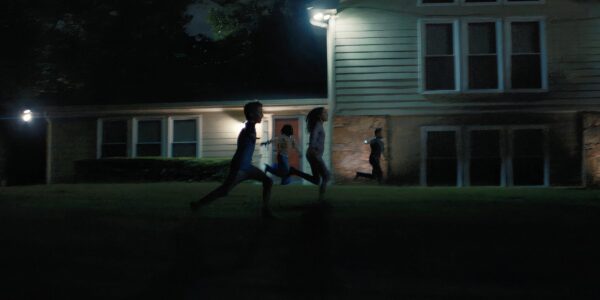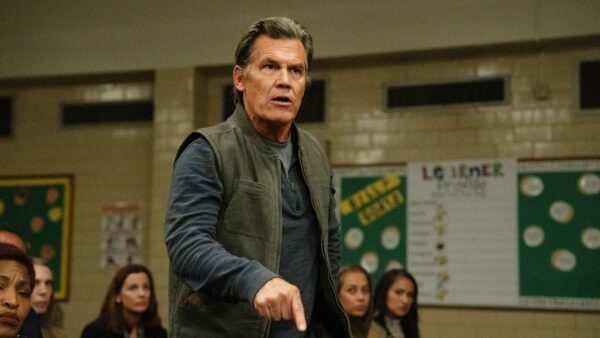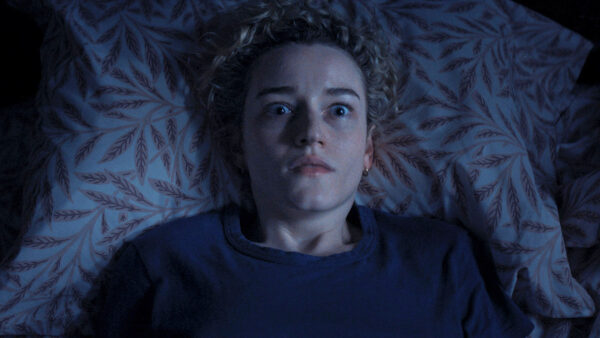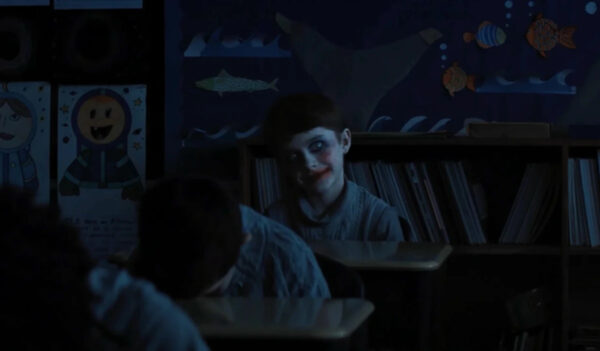
After the twists and turns of his breakout film Barbarian, horror fans have been eagerly waiting to see what writer/director Zach Cregger would do next.
The answer is Weapons, another non-linear thriller packed with big swings, comedic edits, and violent/visceral outbursts.
The story concerns the small town of Maybrook where an entire class of third grade students (17 kids) disappears in the middle of the night. The movie opens with a voice-over by a whispery (never seen) child who speaks with the same hushed reverence used for a campfire tale (or an urban legend, or a creepy pasta). As the child speaks, their story is accompanied by haunting imagery of children leaving their homes and running into the night with their arms spread wide like airplanes.
Cregger is clearly in love with this visual because he lingers on this sequence for a while before the story shifts to address the fall-out. One month later, the school reopens and a PTA meeting is held where several parents’ make public their suspicions of and ire at the teacher, Justin Gandy (Julia Garner).
She claims to know nothing. Ditto the lone unaffected child, Alex Lilly (Cary Christopher), from her class. So what is really happening?

Both of their perspectives, as well as several others, will eventually be explored in Cregger’s sprawling 2+ hour epic. Weapons adopts the same protagonist- and perspective-hopping structural approach as Barbarian, which results in many of the same strengths and weaknesses as his previous film.
On the pro side:
- By circling back on itself, Weapons builds on the audience’s awareness of what has already happened to fill in narrative gaps. In this way, characters like grieving parent Archer (Josh Brolin) can pick up the baton from Justine and anticipate other developments that will arise in later sections of the film.
- Switching protagonists are subtly shifts the tone of the film. For example: Justine’s section is tense and paranoid compared to someone like James (Austin Abrams), an unhoused addict, whose story features a great deal more comedy.
On the con side:
- By resetting the protagonist and the perspective, Weapons regularly initiates a soft reset that eases back the tension and suspense. The intention is to then build it back up, but the film must start from scratch, which affects the pacing by purposefully delaying the rising action.
- If it only occurred a few times, this would be more understandable, but Weapons changes its point of view six times. Despite the revelations and the carnage that accompanies the finale, the last few character cards really begin to feel exhaustive.

The biggest issue with Cregger’s storytelling approach is the sense that decisions are being made principally for impact. He and editor Joe Murphy create some masterful comedic beats simply with cuts and transitions, and the film features some truly outstanding horror set pieces and practical gore effects. It is these moments when Weapons is firing on all cylinders, evoking a thrilling “WTF” roller coaster ride feel (a sentimental that several characters literally – and rightfully – express throughout the film).
It is only in hindsight that it becomes clear how much of the film is visceral simply for visceral’s sake. While the end of Weapons is unquestionably a hilarious, gruesome, and disgusting delight, the route to get there is, at times, unwieldy, circuitous, and maybe even pointless.
There’s a touch of self-indulgence in several of these segments, particularly those featuring James, police officer Paul (Alden Ehrenreich), and school principal Marcus (Benedict Wong). Sure these sections may contain a scary moment, or a key piece of information, or a shocking cliffhanger, but in hindsight they only truly work in the moment. The minute one reflects on them, it becomes clear that the majority of these characters and their accompanying part of the film is superfluous and/or kinda immaterial.
Too much of Weapons ultimately falls into this category. In the theatre, surrounded by an audience who is engaged with the film, the movie works. But when the film ends and the audience disperses and the communal experience is over, it feels empty and hollow. Perhaps that’s the power of cinema, but it also feels like Weapons doesn’t ultimately have anything to say.
It’s a thrill ride, but when the ride is over, so is the impact. 3.5/5

Other Observations:
- It would be a crime not to recognize the outstanding work of Amy Madigan as Gladys. This mysterious character shows up briefly in a few key scenes before taking over in the back half of the film. Whether she’s nightmare fuel or providing punchlines, however, Madigan’s performance is exceptionally bizarre and memorable. I have spent more time than I care to admit speculating about a Gladys & Longlegs cross-over.
- One element the film does very well is its humour. Sometimes the cliffhanger serves as a funny punctuation; other times the violence, such as a key interaction between James and Paul, is hilarious. And then there’s the finale, which is easily one of the year’s best sequences to experience with an audience because it is so go-for-broke ridiculous. A lot of Weapons is incredibly upsetting, but a lot of it is also pretty fucking funny.
- Legitimate question for folks to discuss after the film: does Cregger know any older women and, if so, does he hate them?
Weapons is in theatres Aug 8